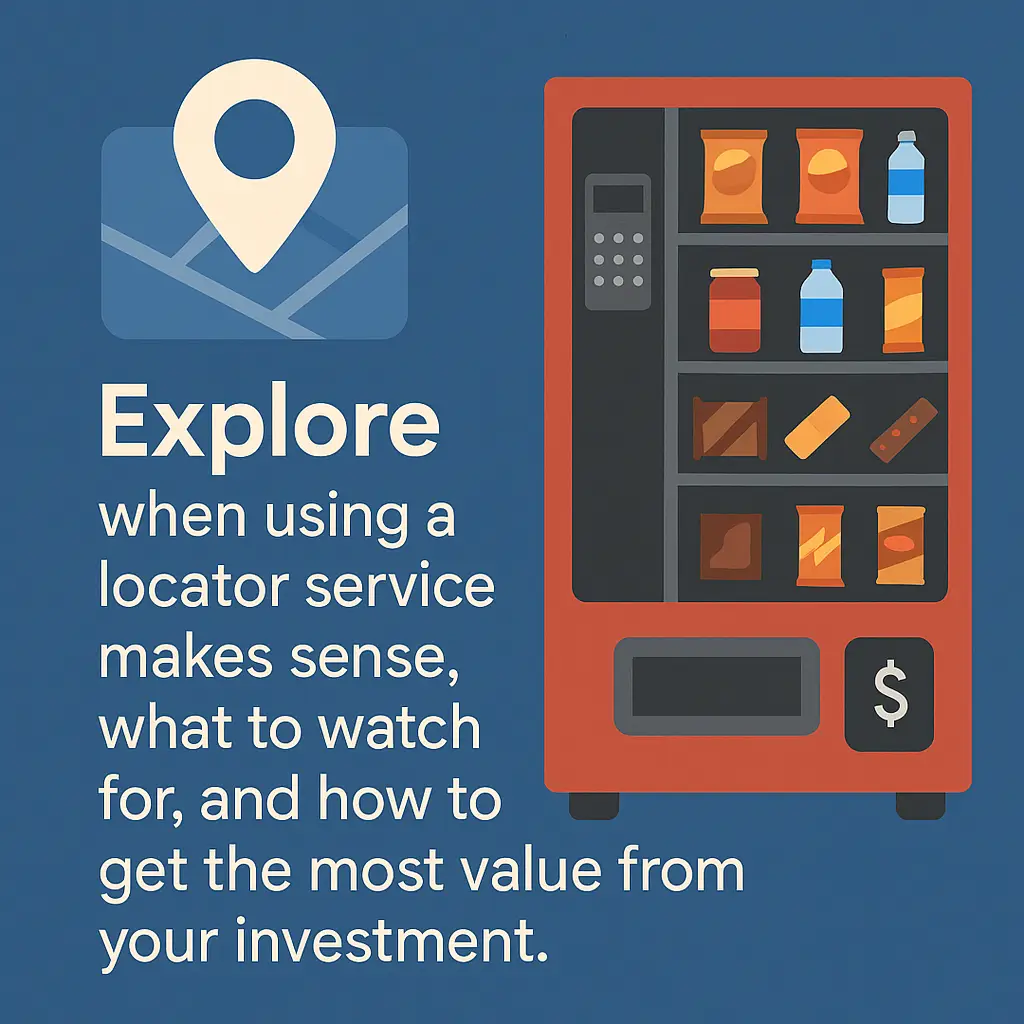Should You Use a Vending Locator Service?
Explore when using a locator service makes sense, what to watch for, and how to get the most value from your investment.
Back to Vending for Apartments ResourcesExplore when using a locator service makes sense, what to watch for, and how to get the most value from your investment.
Back to Vending for Apartments ResourcesStart your 30-day free trial and get instant SMS and email alerts whenever a local business needs vending service. These are real location leads to help you grow your route — you decide which ones to buy, no obligations or contracts.
![]() Locator services help speed up market entry for new vendors
Locator services help speed up market entry for new vendors
![]() Quality locators pre-verify traffic, size, and power access
Quality locators pre-verify traffic, size, and power access
![]() Different fee structures impact overall vending ROI
Different fee structures impact overall vending ROI
30 days free, then $39 / month.
No Commitment. Cancel Anytime.

Vending locator services help vending operators find ideal business locations for placing machines. But are they worth it? The answer depends on your experience level, time availability, and risk tolerance.
For beginners or those expanding into new markets, a locator can save weeks or months of cold calling. A reliable locator typically pre-qualifies sites based on foot traffic, machine accessibility, power availability, and permission from decision-makers. This not only saves time but also reduces the likelihood of selecting poor-performing locations.
That said, not all locators offer the same value. Some may recycle lists of low-volume spots or fail to deliver on promises. Look for services that provide detailed location info beforehand and offer some level of replacement policy if a site underperforms or denies access. Working with a provider that delivers leads on demand—rather than bulk prepaid packages—can also reduce your risk.
Keep in mind that locator pricing models vary. Flat fees, location-based charges, or commission-based structures are common. Each has pros and cons depending on your margins and machine type. Be sure to factor in machine size, contract terms, product pricing, and servicing access. A high-traffic spot won't yield much if stocking it regularly is a challenge.
Using a vending locator can be particularly helpful when expanding into schools, offices, or secured-access areas, where building relationships from scratch can be especially time-consuming. For those with stronger sales skills or an existing local network, self-placing may offer better margins over time.
Also, consider your budget and long-term growth goals. If you're starting with limited cash or want to test a market quickly, locator services can offer fast traction without long-term commitment.
For more guidance, review the permits and licensing essentials before opening accounts. Also, if machines at locations aren't maintained properly, brush up on these vending repair basics.
Vending Exchange connects vending operators with real businesses actively looking for vending services—including traditional machines, AI coolers, and office coffee. Get instant SMS and email alerts when new opportunities are available in your area. No contracts or monthly fees—just buy the leads you want. Start your free 30-day trial today and grow your vending business on your terms.
Use a locator service when you're new, short on time, or expanding into a new area where you lack connections.
No, some are low-quality or even scams. Research reviews and ask about replacement policies and lead details before buying.
Prices vary and may be flat-rate per location, commission-based, or bundled. Always calculate how this impacts profit margins.
Good sites have steady foot traffic, easy access, power availability, and permission from a decision maker or property manager.
High-quality locators often offer replacement guarantees if a location fails quickly or lacks access, but always ask first.
If you have sales skills and local contacts, self-placement may be more profitable. Newer operators may benefit from locator help.
Most locators focus on placement, not permits. Be sure to handle licensing separately to stay compliant.
Some can place you within a week, while others take longer. Ask about average placement timeframes before committing.
Common industries include offices, apartments, schools, and warehouses—places with consistent foot traffic and employee presence.
Yes, though fewer specialize in it. Be sure to specify your equipment type and needs when contacting a locator.